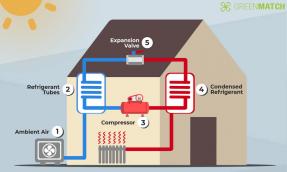Heat Pumps - Energy Efficient and Cost Effective Heating & Cooling Solutions


Heating, ventilation, and air conditioning, or HVAC, is often the biggest hurdle to reducing your home’s carbon footprint. How can we stay warm or cool while reducing our dependence on fossil fuels?
A clean energy, cost effective and reliable answer may be a heat pump system, which could potentially replace both your heater and air conditioner. At its core, a heat pump is a device that transfers heat from a colder area to a hotter area, making a cold space colder and warm space warmer. This will save money on utility bills as well as protect our climate by lessening harmful carbon pollution and reducing other greenhouse gases.
If the prospect of replacing your current HVAC system seems daunting, you should know that a heat pump transition can be as small or large scale as you want. So don’t let installation hassles scare you off - there will likely be an option to match your needs and budget.
A common question about green alternatives is reliability - will they work as well or better than what you have? This particular technology is not new and has proved itself over and over again - you may not realize it, but you have been using heat pumps in your home already for a long time. Heat pumps are used in refrigerators, dehumidifiers, and air conditioners - operating by electricity to move heat in and out of a space as needed rather than generating it. Applying this principle to your home, a heat pump can control the temperature of the same size space as a standard heater/air conditioner for potentially a quarter of the cost in energy bills.
Here are some pros and cons about heat pump systems to help decide if they might work for you. If they look attractive, your next step would be to talk to professionals who will look at your requirements and specific property and offer concrete suggestions.
Advantages
-
Lower operating costs than combustion systems, such as furnaces and boilers which use natural gas, oil or electricity
-
Lower maintenance - a simple annual check done by the homeowner and a three to five year check by a professional
-
Safer than combustion systems since there no risk of carbon monoxide poisoning or gas explosion while using a heat pump
-
Reduced CO2 emissions due to an efficient conversion rate of energy to heat
-
Extremely high efficiencies of up to 300 percent compared to 95 percent with combustion systems - the more energy efficient the systems are, the greater long term savings
-
Provides heating and cooling since they are able to reverse the process and can conveniently be switched to cooling mode during the summers
-
Renewable heat incentives and rebates from federal government and state governments - to find out which ones you may qualify for in your area through the Database of State Incentives for Renewables and Efficiency (DSIRE)
Disadvantages
-
Possible high upfront costs (could still be offset by lower operating costs and the subsequent energy savings)
-
Complex installation considering that research must be conducted in order to understand the movement of heat, your household requirements and local geology, in the case of ground source heat pumps
-
Not entirely carbon neutral since some electricity is required for operations
Heat pumps come in two major categories, air and ground source. Both of these come with their own advantages and work best for different types of homes.
Air source:

The simplest and most widely used type of heat pump, which true to its name, takes heat from the air outside a building to circulate it inside. Electric air-source heat pumps, often used in moderate climates, use the difference between outdoor air temperatures and indoor air temperatures to cool and heat your home.
The actual outdoors temperature doesn’t matter, as all air above absolute zero on the Kelvin scale or -273 Celsius, (which simply cannot occur in nature) holds some amount of energy and that is what is used for heat, as opposed to conventional HVAC where the energy would all come for your supplier via electricity or gas. Here’s how it works:
1. Air is drawn into the outdoor unit of the heat pump through a fan.
2. The air flows over a tube with refrigerant fluid being pumped through it (known as a heat exchanger). Since the refrigerant is colder than the outside air, the heat from the air is transferred to the refrigerant, warming the liquid.
3. The refrigerant evaporates as it warms and the vapor is then compressed to concentrate the absorbed heat.
4. The concentrated hot vapor passes through a second heat exchanger, which supplies the heat energy to your home. The vapor eventually cools and condenses into fluid to be pumped back through the first heat exchanger to collect more heat energy from the outside air and continue the cycle, maintaining air temperature indoors.
In warmer seasons, the process is reversed - transferring the heat from inside air to the outside, effectively cooling the inside, by pumping the refrigerant through a heat exchanger inside your home first, where it absorbs heat energy and moves it outside.

Air source heat pumps can be integrated into an existing air duct system or be purchased as ductless units if you need to regulate only a certain part of your home. A ductless heat pump would be installed similarly to an air conditioner unit, placed either in wall or window to the outside.
They can also serve as water heaters (hybrid water heaters) and take heat from the surrounding air into the water tank rather than generating heat and offer a greener alternative to fossil fuels or conventional electric hot water heating.
Ground source:
Geothermal heat pumps (GHPs) transfer heat from the ground to buildings during the winter and reverse the process in the summer. Air temperatures above ground change throughout the day and with the seasons, while temperatures of the earth even just 10 feet below ground are consistently between 50°F and 60°F. For the majority of the continental United States, this means soil temperatures are usually warmer than the air in winter and cooler than the air in summer, making it an ideal fit for our seasonal heating and cooling needs.
GHPs are efficient because they use the earth's natural heat to provide heating, cooling, and often, water heating. While this is the most complicated in terms of installation, it is also by far the most environmentally friendly, allowing a home to be completely independent of fossil fuels for their HVAC systems. However, because of the scope of the project, external factors can affect whether a GHP is a good fit for your home, such as the size of your lot, type of subsoil and general location.
It is true that heat pumps use a small amount of electricity, and this may come from fossil fuels or other non-renewable sources. However, it is only what is needed for the mechanical operations of the heat pump, such as the fan, compressor and pump. No matter where your electricity is coming from, the decrease in the amount used will dramatically shrink the carbon footprint of your HVAC system. Heat pumps represent the most efficient alternative to fuel, oil and electric systems with regards to both heating and cooling. They supply more heating and cooling capacity than the electricity used to run them and they are a smart investment in the long run.
For further reading, check out:
Are air source heat pumps right for you? - EnergySage
Heat pumps buying guide - Home Tips
Buying guide - Consumer Reports
Is geothermal energy right for you? - Eartheasy
- Filed Under: Heat Pumps
- ( 28354 ) views

Master's in Media Innovation from Northeastern University Freelance journalist and blogger
- ( 0 ) Ratings
- ( 0 ) Discussions
- ( 0 ) Group Posts
Reply/Leave a Comment (You must be logged in to leave a comment)
Great article and very informative but you lost at 'refrigerant'. A 300% efficiency figure has to be magically created from one of the most deadly substances on earth. There must be a better way!!
By Shinobi I Sep 19, 2020@ Shinobi- you are correct. The GWP of refrigerants are really high and must be managed well. The ones that have a lower GWP are more flammable. Whenever they find one that does not impact the environment and is safe around consumers, then the everything will change.
By Matt Hoots I Sep 21, 2020@Shinobi- Here is a discussion we created on refrigerant management-
https://www.rateitgreen.com/green-building-community/discussions/products/video-learning-about-smarter-refrigerant-management-with-trakref/4688
Connect with us!
Subscribe to our monthly newsletter:
Related Posts
-

-
 VRF Heat Pump Installation - In Progress!! Apr 30, 2024
VRF Heat Pump Installation - In Progress!! Apr 30, 2024 -
 Heat Pumps and Cold Weather - Q&A / Myth Busting Feb 19, 2024
Heat Pumps and Cold Weather - Q&A / Myth Busting Feb 19, 2024 -

-



























Not a Member Yet? Register and Join the Community | Log in